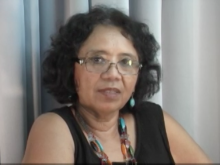
Born: March 30, 1946
Anna NietoGomez was born on March 30, 1946 and was raised on the west side of San Bernadino County, California. NietoGomez recalls that growing up in a segregated community made her aware of racism from an early age. She also recounts growing up in a home where power dynamics between her mother and father were more pragmatic and egalitarian. It was these early insights and environments that would propel NietoGomez into a powerful journey of activism and revolutionary scholarly work.
The daughter of a World War II veteran and a railroad clerk, NietoGomez began her career in higher education at San Bernadino Community College but she soon matriculated into California State University at Long Beach. While at Long Beach, NietoGomez began to formalize her activism through student organizing in M.E.Ch.A. and UMAS, publishing collectives, one which lead to the newspaper Las Hijas de Cuauhtemoc, counseling through the EOP office at Cal-State Long Beach and other informal mentoring capacities.
Approaching the turn of the decade in the late 1960’s, NietoGomez eventually began working as an assistant professor in Chicano Studies at Cal-State Northridge (CSUN). NietoGomez pioneered and gave rise to what is arguably the first critical Chicana Studies curriculum. Through her personal research and community organizing experiences, NietoGomez singlehandedly wrote the curriculum for four classes on the Chicana with topics ranging from history, contemporary social issues, global identity, and the family. Nevertheless, in a tenure dispute that escalated into a national call for action in solidarity with Chicana women in higher education, NietoGomez resigned from Northridge in the fall of 1976. The case of NietoGomez’s professorship and tenure demonstrates the pitfalls of the white male dominated Ivory Tower and of machista Chicano ideology, both institutions challenged by NietoGomez and her supporters—students, professors, and Chicanas and Chicanos alike from across the country—who believed she was a victim of racism, sexism, and academic elitism.
NietoGomez is a true activist/scholar who often bridged the barrio with academia directly. Her commitment to the cause of social justice is nourished by her capacity to endure and remain steadfast in the ideals she crafted over her expansive career as a writer and editor. Beyond her groundbreaking essay and journal La Femenista and Encuentro Feminil, NietoGomez has been producing and researching in the areas of sexuality, reproductive rights, workers rights, welfare rights, higher education, and policy up until the present day.
